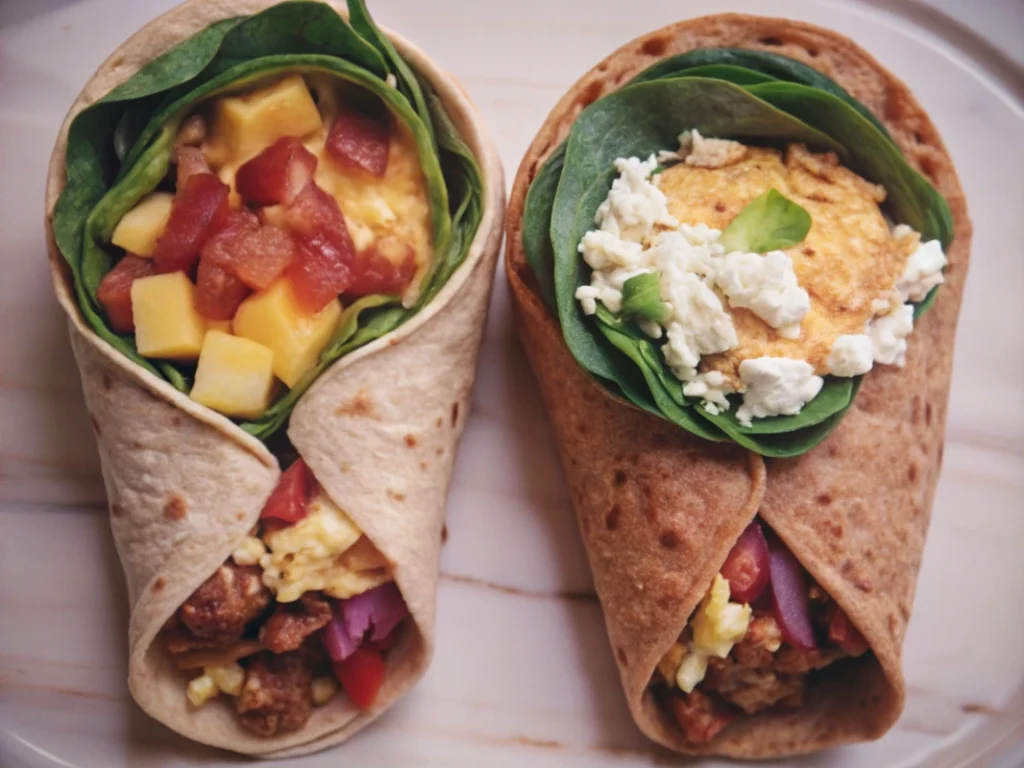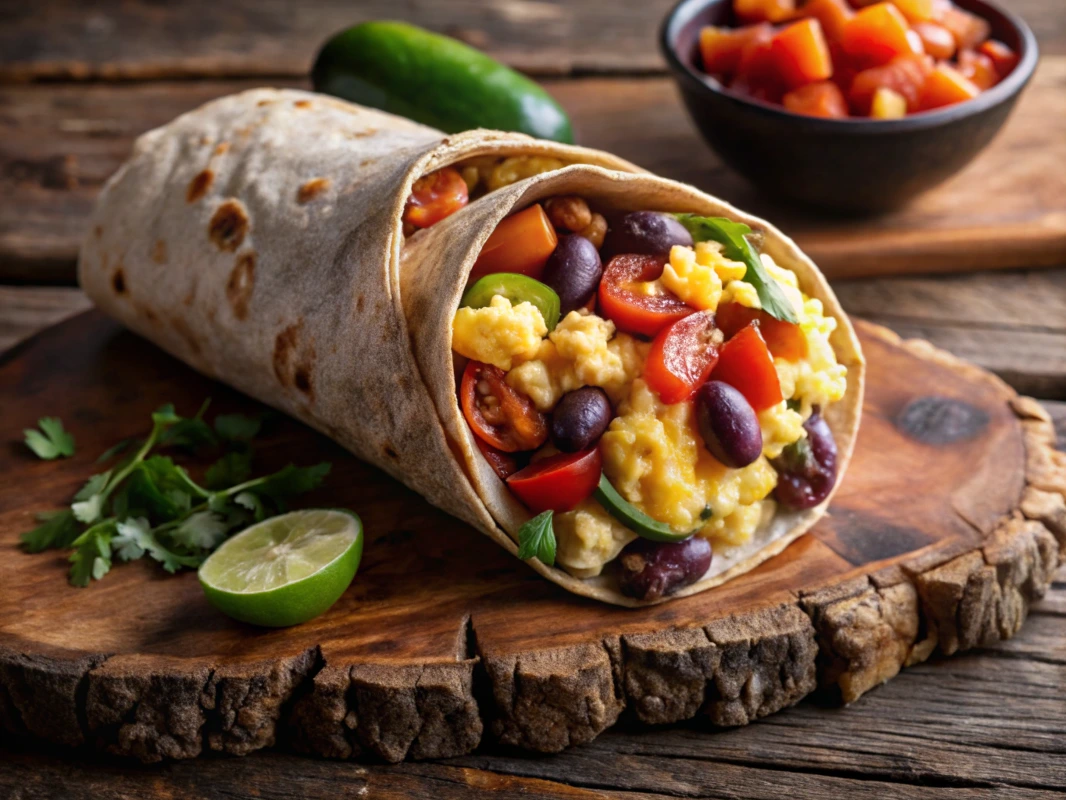What is the Nutritional Value of a Breakfast Burrito?
Breakfast burritos are a go-to meal for many people craving a quick, satisfying start to their day. But have you ever paused mid-bite and wondered, What is the nutritional value of a breakfast burrito? From the hearty ingredients like eggs, bacon, and cheese to healthier options with veggies and whole-grain tortillas, the nutritional content can vary wildly. This article dives deep into the calories, macronutrients, and health benefits (or pitfalls!) of breakfast burritos. We’ll also explore how ingredient choices, cooking methods, and portion sizes affect their overall nutritional value. Plus, we’ll answer some burning FAQs, like whether they’re actually good for you and how they stack up against other breakfast staples.
So, if you’re curious about whether your favorite morning wrap is a nutritious powerhouse or a calorie bomb, stick around. We’ve got all the facts—and some surprising tips to make your breakfast burrito both delicious and healthy!
Introduction to Breakfast Burritos
What is a Breakfast Burrito?
A breakfast burrito is exactly what it sounds like—a flour tortilla stuffed with classic breakfast ingredients like scrambled eggs, cheese, and meats such as bacon, sausage, or ham. Originating from the Southwestern U.S., particularly in Tex-Mex cuisine, it’s become a beloved breakfast staple across the country. Some versions throw in potatoes, beans, or veggies, while others stick to a minimalist approach with just eggs and cheese. You’ll even find vegan breakfast burritos packed with tofu, black beans, and avocado, catering to the plant-based crowd.
But no matter the filling, one thing’s for sure: breakfast burritos are portable, customizable, and downright tasty. They’re perfect for busy mornings when you need a hearty meal on the go.
Why Understanding Nutritional Value is Important
While breakfast burritos are undeniably delicious, they can be a double-edged sword when it comes to nutrition. Depending on what’s inside, they can either fuel your day with protein, fiber, and essential vitamins—or load you up with excessive calories, fats, and sodium.
Knowing the nutritional value of your breakfast burrito helps you make informed choices, especially if you’re watching your weight, monitoring cholesterol, or trying to stick to a balanced diet. Plus, understanding how to tweak ingredients can turn this comfort food into a healthy breakfast option that doesn’t sacrifice flavor.
In the next sections, we’ll break down exactly what’s in your breakfast burrito and how it impacts your health. Whether you’re a bacon-and-egg lover or prefer a veggie-packed wrap, we’ve got you covered!
Basic Nutritional Components of a Breakfast Burrito
Calories in a Breakfast Burrito
So, how many calories are in a breakfast burrito? Well, that really depends on what’s inside! A basic breakfast burrito with eggs, cheese, and a flour tortilla clocks in at around 300 to 400 calories. But throw in bacon, sausage, potatoes, or extra cheese, and you’re looking at 500 to 700 calories—or even more. On the flip side, healthier options with veggies, lean meats, or whole-grain tortillas can keep your burrito under 350 calories.
But why does this matter? If you’re trying to maintain or lose weight, knowing the calorie content is crucial. Even though breakfast burritos are filling, it’s easy to underestimate their calorie count—especially when you’re on the go.
Macronutrients: Protein, Carbohydrates, and Fats

Let’s break it down further. The macronutrient profile of a breakfast burrito is typically a mix of proteins, carbs, and fats:
- Protein: Eggs, meats like bacon or sausage, and cheese are protein-packed. A standard burrito can give you anywhere from 15 to 25 grams of protein, which helps keep you full and energized.
- Carbohydrates: The tortilla is the main source of carbs, contributing around 25 to 35 grams. Add potatoes or beans, and that number rises. For those watching their carb intake, opting for a low-carb wrap or skipping the potatoes can make a difference.
- Fats: Cheese, oils, and meats add fats—sometimes a lot. A typical burrito can contain 15 to 30 grams of fat, with saturated fats making up a big chunk if you’re using processed meats and full-fat cheese.
Balancing these macronutrients can help make your breakfast burrito a nutritious, balanced meal rather than a calorie bomb.
Vitamins and Minerals in Common Ingredients
Beyond calories and macros, breakfast burritos are loaded with essential vitamins and minerals. Here’s what you might find:
- Calcium from cheese helps strengthen bones.
- Iron from meats and beans supports healthy blood circulation.
- Fiber from veggies and whole-grain tortillas aids digestion.
- Vitamin C from salsa or bell peppers boosts your immune system.
However, keep an eye on the sodium levels, especially if your burrito is loaded with processed meats or salty cheese. Some burritos pack over 1,000 mg of sodium—that’s almost half of your recommended daily intake!
Factors Affecting the Nutritional Value
Ingredient Choices: Meat, Veggies, or Vegan Options
The biggest factor influencing what is the nutritional value of a breakfast burrito? You guessed it—ingredients. A burrito stuffed with bacon, sausage, and cheddar cheese will look very different nutritionally from one filled with spinach, black beans, and avocado.
- Meat-based burritos are typically higher in protein but also pack more saturated fat and cholesterol.
- Veggie-packed burritos offer more fiber, vitamins, and antioxidants, making them lighter and more nutrient-dense.
- Vegan burritos can be incredibly healthy, especially when using plant-based proteins like tofu or beans. Plus, they tend to be lower in saturated fats.
So, whether you’re a meat lover or a veggie enthusiast, ingredient choices are key to controlling the nutritional profile of your burrito.
Cooking Methods: Grilled, Fried, or Baked
How you cook your breakfast burrito also plays a big role in its nutrition.
- Grilled or baked burritos tend to be healthier, as they use less oil and retain more nutrients.
- Fried burritos (sometimes called chimichangas) might taste deliciously crispy, but they add unnecessary fats and calories. Deep frying can nearly double the calorie content!
- Microwaving is quick and easy, but be cautious with pre-packaged frozen burritos, which can be high in preservatives and sodium.
Choosing healthier cooking methods can make a big difference in how nutritious your breakfast burrito turns out.
Portion Size and Add-ons (Sour Cream, Salsa, etc.)
Finally, let’s talk about portion sizes and those sneaky add-ons. It’s easy to overload your burrito with extras like sour cream, extra cheese, or guacamole. While these toppings taste great, they can significantly boost the calorie and fat content.
Even something as innocent as salsa can sneak in extra sodium if you’re not careful. On the other hand, swapping sour cream for Greek yogurt or choosing fresh veggies as toppings can enhance the flavor without piling on calories.
And don’t forget—portion control matters. A burrito the size of your forearm might be satisfying, but splitting it in half or saving some for later could be a smart move for your waistline.
Comparing Breakfast Burritos with Other Breakfast Foods
Breakfast Burrito vs. Traditional Breakfast (Eggs, Toast, Bacon)
When deciding between a breakfast burrito and a traditional breakfast of eggs, toast, and bacon, it’s all about balance. A breakfast burrito wraps all these ingredients into one convenient package, but how does it stack up nutritionally?
A standard breakfast plate with two eggs, two slices of bacon, and toast typically contains around 350 to 400 calories. In comparison, a breakfast burrito with the same ingredients might clock in at 500 to 600 calories, mostly because of the tortilla and any extras like cheese or potatoes. However, the burrito is often more filling due to its combination of protein, fats, and carbs in a compact form.
On the flip side, traditional breakfasts can be easier to portion control. You might skip the bacon one day or add more veggies to your eggs. With a burrito, everything is bundled together, making it tempting to eat the whole thing—even if it’s a little more than you need.
Breakfast Burrito vs. Other Grab-and-Go Options (Bagels, Smoothies, etc.)
So, how does a breakfast burrito compare to other quick breakfasts like bagels or smoothies? Surprisingly, breakfast burritos often come out on top when it comes to nutrient density.
- Bagels with cream cheese might seem like a lighter option, but they can contain just as many calories (around 400 to 500) with far less protein and fiber. That means you’re likely to feel hungry again sooner.
- Smoothies can be packed with fruits and veggies, but they sometimes lack the protein needed to keep you full unless you add extras like Greek yogurt or protein powder. Plus, if you’re buying pre-made smoothies, they often have added sugars that can spike your blood sugar.
In contrast, a well-made breakfast burrito offers a balanced mix of protein, carbs, and fats, making it a more satisfying option that can fuel you for hours. Of course, portion size and ingredients are key—an overloaded burrito can still tip the scales in terms of calories.
Health Benefits and Concerns of Breakfast Burritos

Health Benefits: High Protein, Satiating, and Customizable
When you think about what is the nutritional value of a breakfast burrito, it’s not all about the calories—there are plenty of health benefits, too!
First off, breakfast burritos are usually high in protein, especially if they include eggs, meats, or beans. This protein helps keep you full longer, reducing the chances of mid-morning snacking. Plus, they’re incredibly customizable. You can load them up with fiber-rich veggies, swap regular tortillas for whole-grain ones, or even add healthy fats like avocado to boost their nutritional value.
Another plus? Breakfast burritos are portable and convenient. Instead of skipping breakfast altogether or grabbing something less healthy, you can prepare a nutritious burrito ahead of time and take it on the go.
Potential Health Concerns: High in Calories and Sodium
While breakfast burritos have their perks, they’re not always the healthiest choice. One major concern is their tendency to be high in calories and sodium, especially when packed with processed meats like bacon or sausage and lots of cheese.
A typical store-bought or restaurant burrito can contain over 1,000 mg of sodium, which is almost half of the daily recommended limit. High sodium intake is linked to increased blood pressure and heart disease risks. Plus, with many burritos containing upwards of 600 to 800 calories, they can quickly derail your daily calorie goals if you’re not careful.
How to Make a Healthier Breakfast Burrito
Luckily, making a healthier breakfast burrito is easier than you might think. Here are some quick tips:
- Swap the tortilla: Use a whole-wheat or low-carb wrap instead of a regular flour tortilla to cut down on refined carbs.
- Add more veggies: Load up on spinach, peppers, tomatoes, or onions to boost fiber and vitamin content without adding many calories.
- Choose lean proteins: Opt for turkey sausage, chicken, or even tofu instead of fatty meats like bacon or regular sausage.
- Control the cheese: Use a smaller amount of low-fat cheese or skip it altogether. You’d be surprised how flavorful a burrito can be with just spices and veggies!
- Mind the extras: Be cautious with sour cream and guacamole—they add flavor but also extra calories. Swap sour cream for plain Greek yogurt for a protein boost.
By making these simple tweaks, you can enjoy all the deliciousness of a breakfast burrito without the extra calories or sodium.
For more delicious and healthy breakfast ideas, check out our recipe article on Healthy Breakfast Wraps and explore new ways to start your day right!
Popular Types of Breakfast Burritos and Their Nutritional Value
Mexican Breakfast Burrito Nutritional Facts
When you think of breakfast burritos, the Mexican breakfast burrito probably comes to mind first. This classic version usually includes ingredients like chorizo, scrambled eggs, potatoes, cheese, and salsa, all wrapped in a soft flour tortilla. But what is the nutritional value of a breakfast burrito like this?
A typical Mexican breakfast burrito can contain anywhere from 600 to 800 calories, depending on portion size and ingredients. The protein content is often around 20 to 25 grams, thanks to the eggs and chorizo. However, these burritos can also be high in fat—especially saturated fats from chorizo and cheese. On the sodium front, the inclusion of processed meats and salty cheeses can push sodium levels to 1,200 mg or more, which is over half of the recommended daily limit.
Despite the calorie load, the Mexican breakfast burrito also delivers key nutrients like iron, vitamin C (from salsa), and fiber (if you add beans or veggies). To make it healthier, you can opt for leaner meats like turkey chorizo and add more veggies.
Bacon, Egg, Potato, and Cheese Burrito Nutritional Breakdown
The bacon, egg, potato, and cheese burrito is another fan favorite, offering a comforting mix of flavors. But as tasty as it is, this combo can be a nutritional heavyweight. So, what is the nutritional value of a breakfast burrito with these ingredients?
On average, this type of burrito contains 700 to 900 calories, with 25 to 30 grams of protein and 40 to 50 grams of carbs from the tortilla and potatoes. The fat content can be quite high, often exceeding 35 grams, especially if full-fat cheese and multiple bacon strips are used. And don’t forget about sodium—this burrito can pack over 1,000 mg due to bacon and cheese alone.
If you’re looking to make this version healthier, try swapping in turkey bacon, using reduced-fat cheese, or replacing the potatoes with sweet potatoes for more fiber and nutrients.
Vegan or Vegetarian Breakfast Burrito Nutrition
For those who prefer plant-based options, vegan and vegetarian breakfast burritos are fantastic alternatives that can be both delicious and nutritious. These burritos often include ingredients like tofu scramble, black beans, avocado, and a variety of veggies such as spinach, peppers, and onions.
A typical vegan breakfast burrito ranges from 350 to 500 calories, depending on portion size and fillings. They’re usually lower in saturated fats but high in fiber and complex carbs. The protein content might be slightly lower compared to meat-based burritos, but ingredients like tofu and beans still provide a solid 15 to 20 grams of protein.
Plus, these burritos are often rich in vitamins like vitamin C and vitamin A, along with healthy fats from ingredients like avocado. To boost the protein further, consider adding tempeh or using high-protein tortillas.
FAQs
1. What are the nutrition facts of a breakfast burrito?
The nutrition facts of a breakfast burrito vary widely based on ingredients. A standard burrito with eggs, cheese, and a tortilla typically contains 300 to 500 calories, 15 to 20 grams of protein, and around 20 to 30 grams of fat. Add-ons like bacon, sausage, or sour cream can significantly increase calories and fat. On the healthier side, burritos packed with veggies and lean proteins can offer more fiber and fewer calories.
2. Is eating a breakfast burrito healthy?
Is eating a breakfast burrito healthy? The answer depends on how it’s made. Burritos with whole grains, lean proteins, and plenty of veggies can be a nutritious, balanced meal. However, burritos loaded with processed meats, cheese, and high-fat toppings can be high in calories, sodium, and saturated fats. Moderation is key, and small tweaks can turn an indulgent burrito into a healthy breakfast option.
3. How many calories are in a Mexican breakfast burrito?
A Mexican breakfast burrito typically ranges from 600 to 800 calories, depending on the size and ingredients. Chorizo, potatoes, and cheese contribute to the calorie count, while salsa and veggies can add flavor without piling on extra calories. To reduce the calorie content, consider using leaner meats or swapping the tortilla for a whole-wheat version.
4. How many calories are in a bacon, egg, potato, and cheese burrito?
A bacon, egg, potato, and cheese burrito usually contains 700 to 900 calories, with a significant portion coming from fats and carbs. Bacon and cheese are high in saturated fats, while potatoes add to the carbohydrate load. To make this burrito lighter, try turkey bacon, reduced-fat cheese, or adding more veggies to boost nutrients without adding too many calories.
For more tasty and nutritious breakfast ideas, don’t miss our guide on Healthy Breakfast Wraps to explore new ways to kickstart your day!
Conclusion
After diving deep into what is the nutritional value of a breakfast burrito, it’s clear that this popular breakfast option can be both a delicious and nutritious start to your day—or a calorie-packed indulgence, depending on how it’s made. The key lies in the ingredients and portion sizes. Burritos filled with lean proteins, whole grains, and fresh veggies offer a balanced mix of protein, fiber, and healthy fats, keeping you full and energized. On the flip side, burritos loaded with processed meats, cheese, and high-fat sauces can quickly add up in calories, sodium, and unhealthy fats.
Ultimately, breakfast burritos are incredibly versatile. By making smart ingredient swaps—like using whole-wheat tortillas, adding more vegetables, and opting for lean meats—you can enjoy this tasty meal without compromising your health goals. So, next time you’re craving one, you’ll know exactly how to make it both satisfying and nutritious!

